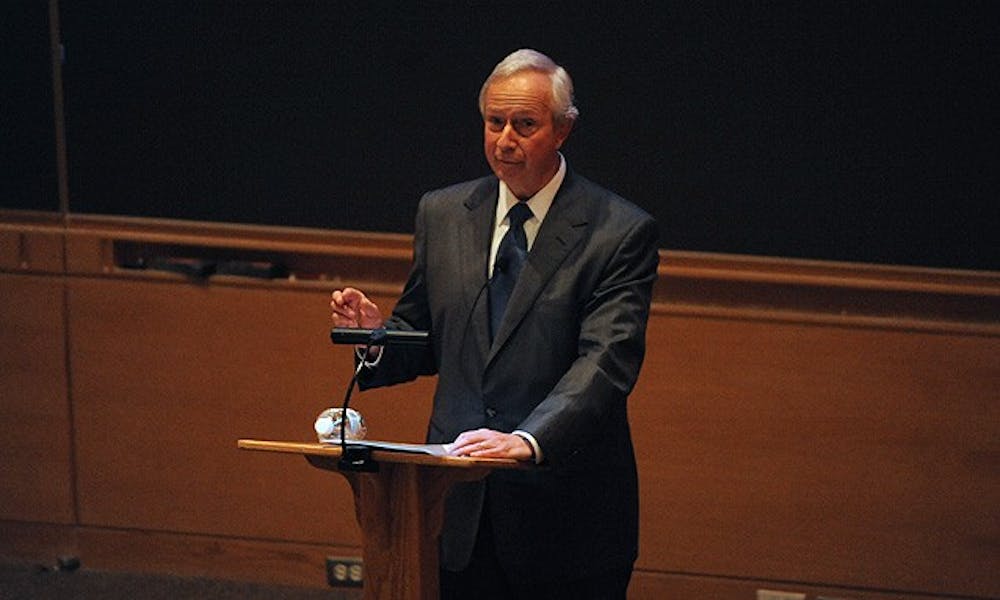Duke has found a new educational sponsor for its Kunshan, China campus after its partnership with Shanghai Jiao Tong University fell through last summer.
The University will partner with Wuhan University as it develops its China campus, President Richard Brodhead announced Thursday. According to the country’s law, a Chinese university must sponsor Duke’s appeal to the Chinese Ministry of Education to open a campus there.
“We appear to have found a suitable partner in Wuhan University... which has been highly respectful in our negotiations of Duke’s leadership role,” Brodhead said in his annual faculty address.
In December, Greg Jones, vice president and vice provost of global strategy and programs, said Duke was looking for a “silent sponsor” in China that would allow Duke to have a prominent role in the partnership.
Speaking to about 100 faculty members and administrators, Brodhead offered few details of the new partnership but said he still expects the Kunshan Campus to open in late 2012.
Brodhead also answered what he called a “fair and important” question—why is the University expanding globally while Durham continues to experience financial hardship?
He acknowledged the monetary costs of the campus in Kunshan—between $1.5 and $2 million per year for five years—but stressed the greater costs Duke will face if it does not widen its global horizons.
“The greatest threat that downturns pose to universities is to stunt forward movement and lock in the status quo. The university that fares best will be the one that... is alert to emerging opportunities and willing to take the steps to seize them,” he said, calling globalization the key to the modern world.
Brodhead acknowledged that China and the United States do not share the same views of academic freedom.
“As we embark on this venture, we must frankly acknowledge that China does not share this country’s attitudes toward open inquiry, freedom of expression and free access to information,” Brodhead said. “The Chinese themselves must learn to accept and embrace [these values] if they are to get the worth of their bargain.”
But Brodhead said Duke must also be willing to learn from China and be open to new ways of thinking about education.
“To be a good global citizen, we need to learn how to expose others to our thinking and open ourselves to theirs and to accommodate differences without violating fundamental beliefs,” he said.
Brodhead believes that this is only possible with a focus on the liberal arts and interdisciplinary study.
“Concepts like interdisciplinarity and internationalization are not mutually exclusive alternatives. They are interdependent to the deepest degree,” he said. “Tellingly, what China most admires in us is an education built on the broad-based, combinatory learning we call the liberal arts.”
Brodhead also discussed the University’s financial achievements over the past year. Duke achieved about two-thirds of its planned spending cuts, he said, praising professors and administrators for their efficiency. He added that, for the 2010 calendar year, the University’s investments returned more than 15.6 percent. For fiscal year 2010, which ended in June, investment returns were 13.2 percent, The Chronicle previously reported.
“I’ll give you a moment to absorb that because this is good news,” he said. “But for a host of reasons, it’s not yet time to loosen our restraint.”
Quoting a poem by Wallace Stevens, Brodhead illustrated how Duke should grow even though the economy still poses challenges.
“He had to choose. But it was not a choice between excluding things. It was not a choice between, but of,” he recited.
He explained that although Duke has to make decisions with financial constraints in mind, it does not have to choose between established programs and new projects. Instead, it should support as many promising projects as possible with its available funds and engage in interdisciplinary studies.
“Money is scarcer than it was, but our project has never been to have a lot of money,” he said. “It is to build the liveliest, most comprehensive and most searching place of inquiry we can possibly envision, with whatever resources we have at hand.”
Get The Chronicle straight to your inbox
Sign up for our weekly newsletter. Cancel at any time.
Lee Baker, Trinity College dean of academic affairs and associate vice provost for undergraduate education, said he found Brodhead’s speech compelling and persuasive.
“I think he felt, perhaps correctly, that he needed to incorporate the arts and sciences, the core of the University,” Baker said. “He made the case of why the traditional disciplines can have an important contribution.”
Additionally, Academic Council Chair Craig Henriquez shared some of the council’s goals for the upcoming year. In the age of blogging and other new means of communication, he hopes that interdepartmental correspondence will improve. Although administrative connections have improved over the years, many professors remain relatively uninformed of the inner workings of the council, he said.
“It is clear that the better the faculty understands how the University works, the better the input will be,” Henriquez said.

